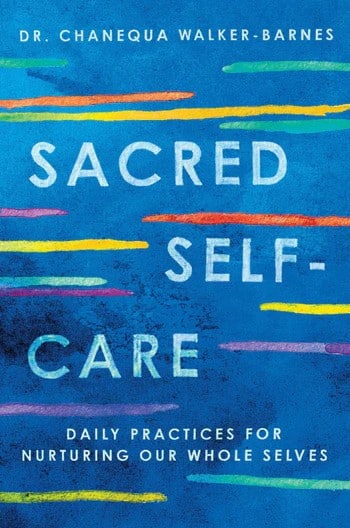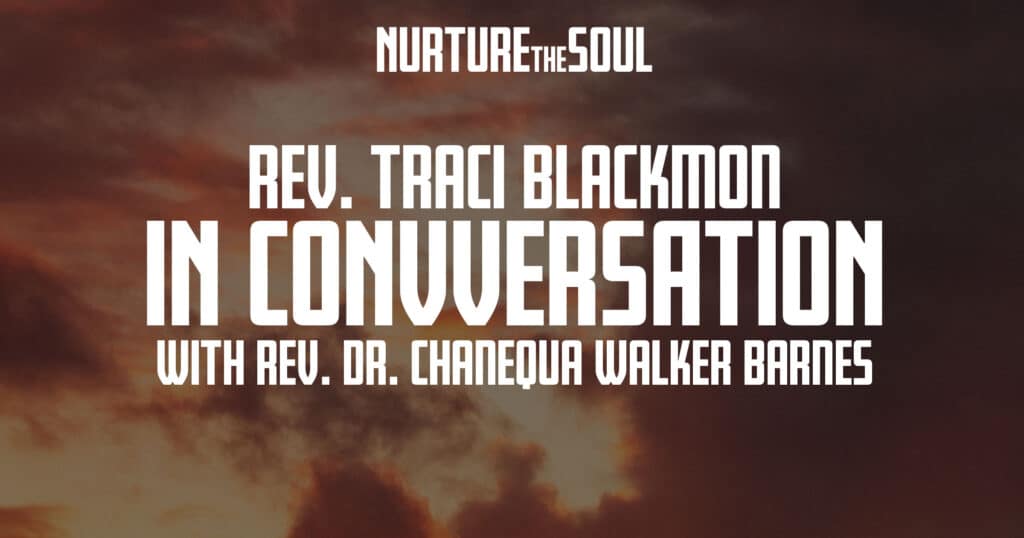Self-care as sacred practice: A conversation with Chanequa Walker-Barnes
The impact of trauma and the need for self-care are vital — and sacred — topics for the church today.
The Rev. Chanequa Walker-Barnes’ most recent book, Sacred Self-Care: Daily Practices for Nurturing Our Whole Selves, centers around these issues. The author and theologian joined United Church of Christ Associate General Minister the Rev. Traci Blackmon for a conversation on trauma, self-care and, at times quite vulnerably, their own personal experiences in relation to their bodies.
They spoke together during the UCC’s weekly “Nurture the Soul” webinar Thursday, Sept. 28.
‘There’s got to be a different way’
Walker-Barnes describes herself as a “psychologist-turned-theologian,” and her work has focused on healing the legacies of racial and gender oppression. A professor of practical theology and pastoral care at Columbia Theological Seminary, she is also the author of two other books — I Bring the Voices of My People and Too Heavy a Yoke.
In introducing the event, Blackmon quoted from Sacred Self-Care: “There can be no spiritual life that does not engage the body.” She and Walker-Barnes discussed the toll that ministry work often takes on people, speaking candidly about the sudden deaths of Black women in leadership — including, recently, a college president.
“I often saw people extending themselves from ministry in ways that did damage to themselves, and that often did damage to their relationship,” Walker-Barnes said. “It didn’t just stay in the body; it filtered out into a breakdown of relationship.”
In witnessing the “ripple effects” of this damage, she said she kept thinking, “There’s got to be a different way of approaching the way we think our bodies than what many of us have internalized from the church.”
Blackmon agreed. “This concept of the ‘holiness of the grind’ is hard for us to escape,” she said.
‘Honor the body God gave us’
Walker-Barnes explained that her book lays out the meaning of self-care when many people have been socialized to think “bodies are bad,” especially after witnessing industries marketing “self-care” as something people have to spend money on to practice.

“I’m talking about something more basic than that: how we honor the body that God gave us though daily or weekly practices,” she said.
Walker-Barnes shared about her own cancer diagnosis and journey and how it changed her relationship with her body.
“It forced me to wrestle deeply with what it meant to be human, what it meant to be a disciple, what it was to wear myself to the point of death for the sake of ministry, especially as an activist, as someone committed to social justice,” she said. “If I’m doing violence to myself, I’m actually supporting the oppressive system that doesn’t want me to be here anyways.”
‘The imprint of God’s image’
In response to an audience question about how Walker-Barnes has seen “white male God theology” lived out in the church (a phrase the questioner attributed to author and theologian Christena Cleveland), she described it as the dominant theology in American churches.
“White male God theology teaches us that we’re not already sacred and holy, and the way we become sacred and holy is pouring ourselves out for the sake of other people’s power,” Walker-Barnes said. “That’s what productivity is about. We’ve learned to think our value lies in our productivity as a worker. And part of the undoing of that, being a woman theologian, is learning how to recognize that each of us bears the imprint of God’s image. That we’re already good.”
The two Black women theologians also discussed the historical and ongoing trauma experienced by women of color and the impact it has caused for their relationships with their bodies.
“For us, the lack of attention to our care is not that we’re thoughtless people,” Walker-Barnes said. “There is a heritage here that for many of us teaches us not to be concerned with issues of the body because that’s not where you experience life because the body was the site of so much pain. But that is a trauma response.
“Part of the work of integrating trauma is learning to live anew, in new relationships with our body, that is not the story oppression taught us.”
Caregivers need care, too
Sacred Self-Care is organized into seven sections with practices for people to engage with. Walker-Barnes said that she intentionally broke the book into “small, doable bits” so that people would feel able to achieve them. She stressed that people who offer care to others need that kind of care for themselves, advising that ministers should have a therapist and a spiritual director.
“Ministers, regardless of context, hold other people’s pain, and you can’t hold other people’s pain without it affecting you,” she said. “That is something I had to learn as a therapist. It’s important for people in ministry to have therapists where we can process what we’re holding in a safe capacity, and it is also important for us to have either a spiritual director or a pastor, to have our own shepherd who can listen for how God is continuing to be at work in our lives.”
Kayla Berkey contributed to this story.
Content on ucc.org is copyrighted by the National Setting of the United Church of Christ and may be only shared according to the guidelines outlined here.
Related News
A Moment of Silence
The weekend news was alarming. Two students shot and killed with 9 injured at Brown University...
Read MoreIn hope-filled worship service, UCC and United Church of Canada celebrate full communion past and future
On Saturday, Dec. 13, many from the United Church of Christ (UCC) and the United Church of...
Read More‘A Gift of God to the World:’ Christmas greetings from the General Minister and President
As Christmas quickly approaches, UCC General Minister and President/CEO the Rev. Karen Georgia...
Read More


